THE FORTUNE NEWS
PREPARING FOR CAREER SUCCESS


SETTING UP TO BE STEPPING OUT




SETTING UP TO BE STEPPING OUT

The Fortune Society’s mission is to support successful reentry from incarceration and promote alternatives to incarceration, thus strengthening the fabric of our communities.

We do this by:
BELIEVING in the power of individuals to change
BUILDING LIVES through service programs shaped by the needs and experiences of our participants
CHANGING MINDS through education and advocacy to promote the creation of a fair, humane, and truly rehabilitative correctional system
Alternatives to Incarceration & Court Advocacy
Benefits Access
Creative Arts
Digital Literacy

Education
Employment Services

Family Services
Food and Nutrition
Healthcare Coordination

info@fortunesociety.org

212.691.7554
The Fortune Society 29-76 Northern Blvd. Long Island City, NY 11101
Walk-In Hours: Monday through Thursday 8:00 am – 8:00 pm Friday 8:00 am – 5:00 pm
HIV/AIDS Health Services
Housing
Mental Health Treatment
Policy and Advocacy (The David Rothenberg Center for Public Policy)

Recovery Center (the NEST)
Transitional Services (RISE)
Substance Use Treatment
Supervised Release
The Fortune Society
@fortunesociety @fortunesociety
fortunesociety.org
Receive top news from Fortune each week by subscribing to the Fortune Weekly email list: fortunesociety.org/subscribe


On December 12, 2022, Fortune presented ‘Beyond Recidivism: Defining and Measuring Success After Incarceration’ in partnership with the National Academies of Sciences, Engineering, and Medicine (NASEM), Pennsylvania Department of Corrections, and Eastern State Penitentiary. Panelists highlighted findings in the 2022 report, “The Limits of Recidivism,” published by NASEM.
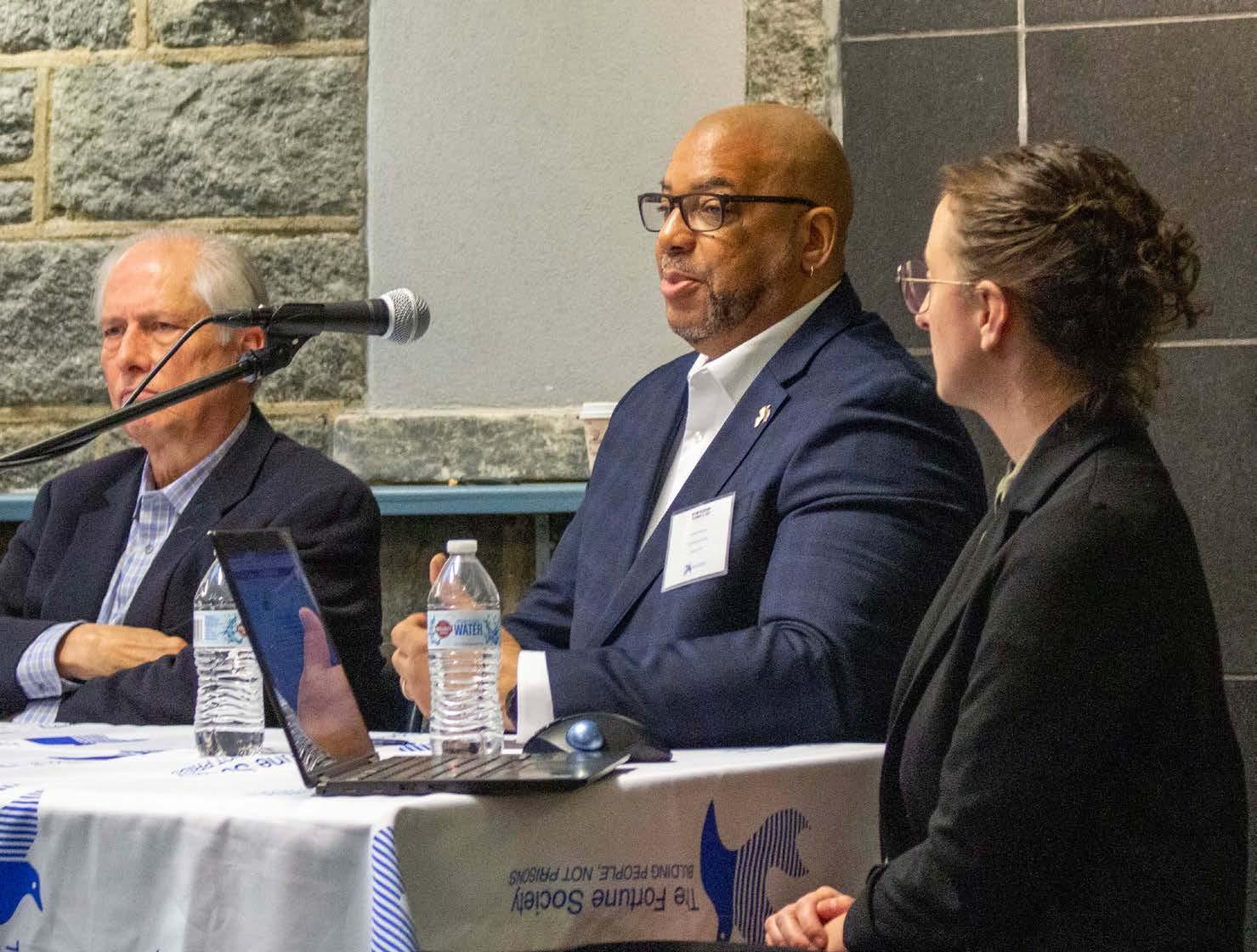
The live-streamed event was viewed by more than 600 participants in 38 states, as well as in the United Kingdom and Germany.
See your writing in the next edition of the Fortune News!
IN THE NEXT ISSUE: TIME
What have you learned with time? What changes with time? What doesn’t? Do you have reflections you can make on the past or thoughts about the future? Tell us about your experiences.
Send written or visual art responses by mail to:
Fortune News Editors c/o The Fortune Society 29-76 Northern Boulevard Long Island City, NY 11101
or via email to: development@ fortunesociety.org
To watch the livestream, head to fortunesociety.org/event-show/beyond-recidivism
In October 2022, Fortune filed suit against iAfford NY, LLC for barring people with previous criminal justice involvement from accessing New York City-assisted affordable housing units in its portfolio, disproportionately disqualifying Black and Latino applicants. Providing housing services and advocating for housing opportunities for people with criminal justice histories are fundamental to our mission because housing is critical to the stability and success of justice-impacted persons as they work to build productive lives in their community for themselves and their families.

In 2020 and 2021, Economic Impact Payments, also known as stimulus checks, were distributed to help with expenses during the COVID-19 pandemic. For those incarcerated, it can be difficult to know whether you have received these payments.
The process of filing taxes while in prison may seem daunting, but it is not impossible. Here are a few steps you can take to file your taxes while in prison:
• GATHER ALL NECESSARY DOCUMENTS: Just like any other taxpayer, you will need to gather all your necessary tax documents, such as your W-2 form, 1040 form and any other relevant tax documents.
• GET ASSISTANCE: If you need assistance with filing your taxes, you can seek help from a tax professional, a trusted family member, or a friend. Alternatively, you can contact the Internal Revenue Service (IRS) and request help with filing your taxes.
• USE THE MAIL: If you are incarcerated, you will not have access to e-file or online tax preparation software. You will need to file a paper tax return by mail. Ensure that you have all the necessary forms and schedules completed and that your tax return is accurate and complete.
• SEND YOUR TAX RETURN: Once you have completed your tax return, you can send it by mail to the IRS. Ensure that you have included all the necessary forms and schedules, and that your tax return is postmarked by the filing deadline.
• FOLLOW UP: After you have filed your tax return, you may need to follow up with the IRS to ensure that they have received it and processed it. You can call the IRS toll-free number or check the status of your tax return online.
Filing taxes while in prison is not impossible, but it can be challenging. However, by following these steps, you can ensure that you comply with the law and avoid any penalties or legal consequences. Remember that seeking assistance from a trusted tax professional or family member can make the process easier and less stressful.
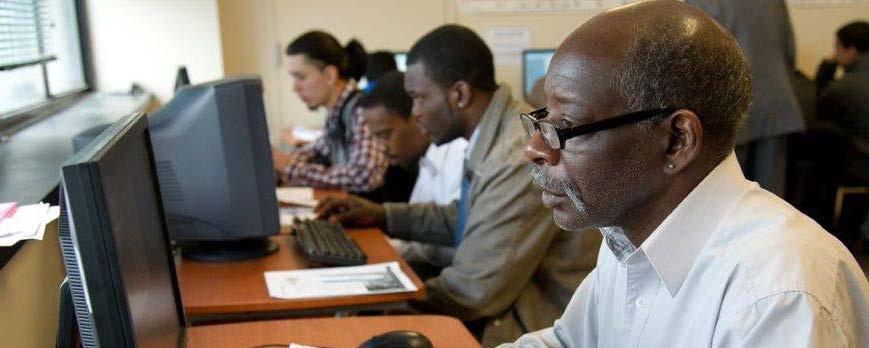
Payments and Deadlines:
Stimulus Check 1 & 2: $1,800
Deadline: File your 2020 tax return by April 15, 2024
Stimulus Check 3: $1,400
Deadline: File your 2021 tax return by April 15, 2025
Calling the IRS:
• Call 1-800-829-1040 from 7 AM-7 PM, Monday through Friday
• Select your language, pressing 1 for English or 2 for Spanish
• Press 2 for questions about your personal income taxes
• Press 1 for questions about a form already filed or a payment
• Press 3 for all other questions
• Press 2 for all other questions
• Make no entry when queried for a Social Security Number
• Press 2 for personal or individual tax questions
• Press 3 for all other questions
a nonprofit that offers job skills training workshops, prompted this move. At CASES, he demonstrated his talents, training other trainers to be more effective. As a result, his job placement record was outstanding, raising clients’ job placement rates to 90%+ from 50-60% before Will implemented innovative training strategies.
Will Beale is Fortune’s Associate Vice President for Programs & Training, with over ten years of training staff in nonprofits that work with people who have touchpoints in the criminal legal system. At Fortune, Will trains staff on deescalation, and has aided other nonprofits with group facilitation and professional development trainings.
Will began his life’s work later than most. He was sent to prison at age 17 and served 17 years, coming home in 2008 at age 34. Along with other formerly incarcerated individuals returning home, he faced the formidable challenge of reentering society.
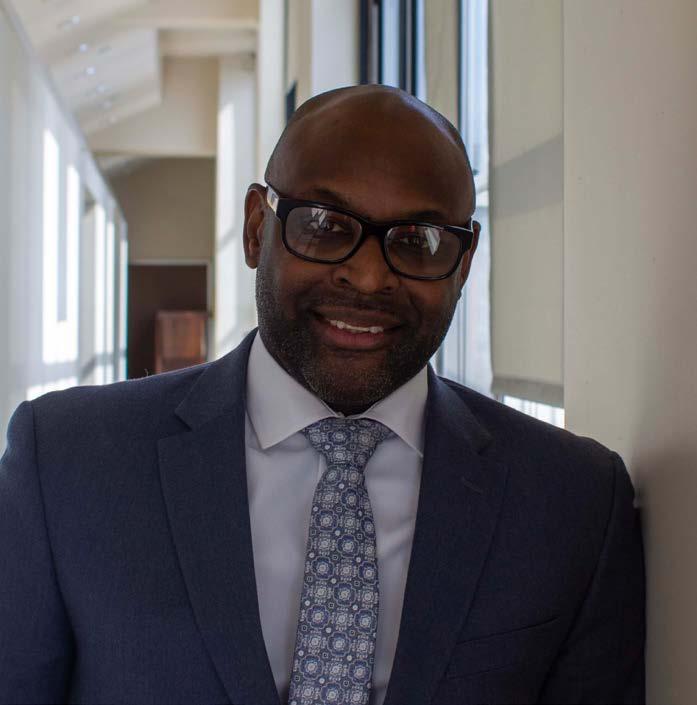
While Will was incarcerated at Wallkill in upstate New York, he trained to become a certified optician. This certification served him well upon coming home when he secured a job as an optical lab technician, moving up to become its manager. Then he went out on his own, establishing Tribeca Eye Wear.
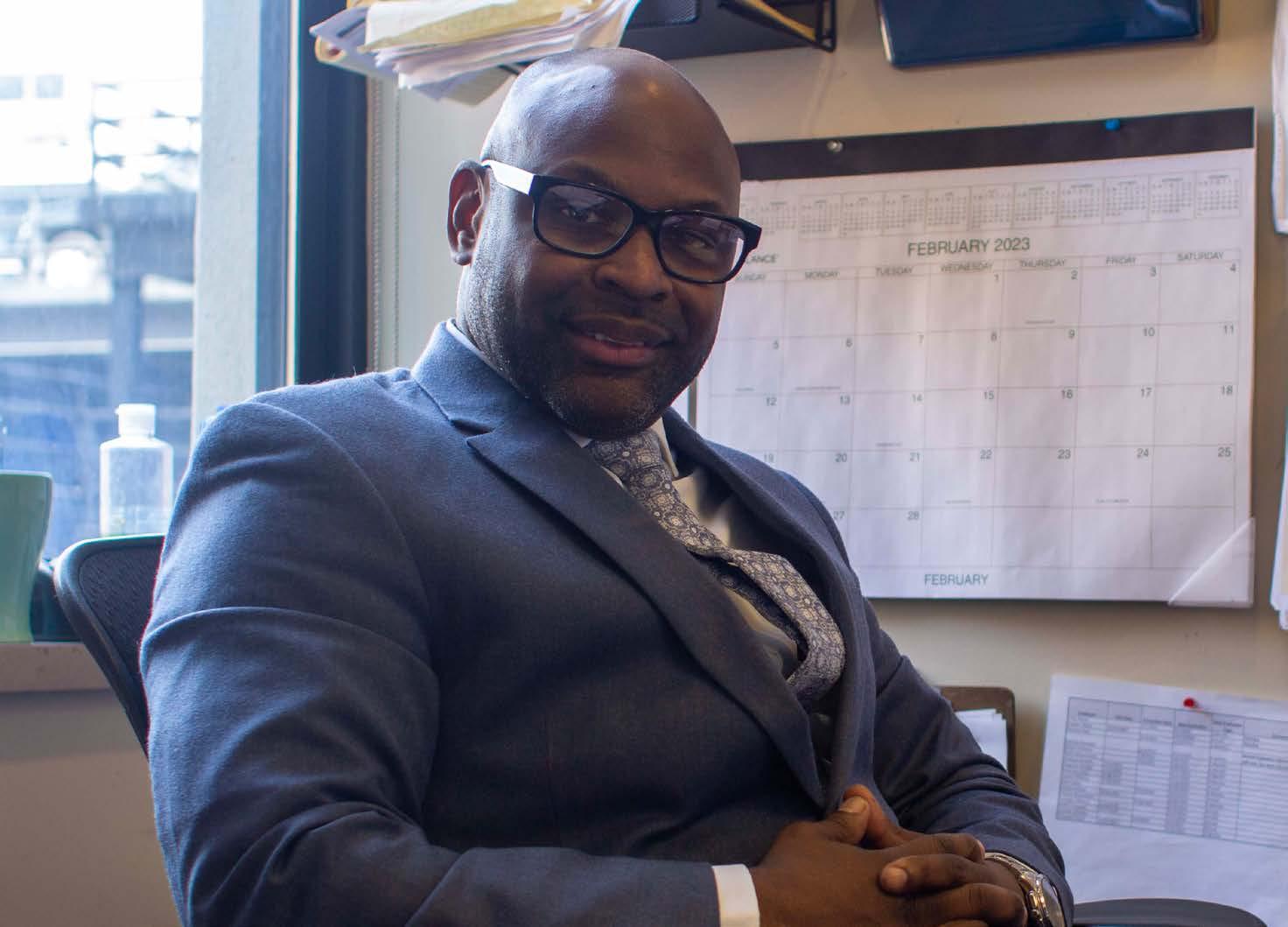
His career took a dramatic shift when he sold his business so he could devote all his energy to helping people develop the skills needed to interview and secure jobs. Many of the people he worked with were newly home from incarceration.
His work with The Center for Community Alternatives (CASES),
With Will’s experience with the criminal justice system and his job training skills, it was inevitable that Fortune found him. He has had two stints at Fortune, the current one lasting over five years. Now, Will is the Associate Vice President of Programs and Training. Even with a full-time career at Fortune, he still takes his training skills to CASES and other nonprofit organizations involved in this work during his off hours. He has also trained John Jay College of Criminal Justice students working toward criminal justice careers.
His dedication to training staff is based on his conviction that improving staff training enhances opportunities for our clients.
“I started from scratch as a grown man learning to be an adult in society.”
dishes I made when I wanted to impress a date, and I could grill just about anything to perfection. But I never knew the proper hows and whys of good cooking. So, I signed up for an introductory culinary class, not expecting too much.
in my Gramma Degi’s kitchen, watching her dance around — seasoning here and tasting there — while she hummed Italian love songs and called me her bambino dolce (sweet baby).
BY SPIN“You gotta take a vocation class if you ever wanna get out of here.”
This is the statement I’ve heard repeatedly since I have been incarcerated. My reply was always, ‘Why?” I’ve worked as an executive at a large corporation, owned my own businesses and was even a licensed electrician before I was locked up.
Then reality set in. There isn’t going to be much call for older men with a criminal record in the workplace. There are opportunities out there, but I would have to retool my skill set to take advantage of them.
When I talked to an education counselor about vocational classes, she asked, “What do you like to do?” “Play music and eat,” I said, but since music wasn’t an option, food was it. I’d always considered myself a good cook. I had my signature
The first thing I learned was applied science. Being the science nerd that I am, this certainly appealed to me. There’s a reason why the recipe says to bring the ingredients to a boil – it accelerates the chemical reaction. Cooking also involves more than taste. Smell, sight, hearing and touch are integral to the eating experience. The sound of fajitas sizzling on a hot plate, the sight of a juicy steak when you cut into it and the feel of chips and fresh veggies as they crunch in your mouth; these are all just as important as taste.
Our instructor made sure we understood the science behind preparing, assembling and presenting a well-cooked meal. He keeps the class fun and exciting while also being informative. Best of all, he lets us do the cooking. If we get a dish a little wrong, it’s okay. Sometimes you learn by screwing up. The next time, you do it better. My favorite part of our class is finishing cooking and getting to eat. Finally, we ate some good stuff!
We make everything from scratch: chicken fried steak, gravy, garlic potatoes, sourdough rolls, raspberry vinaigrette for salads, tomato sauce and dough for calzones and ranch dressing.
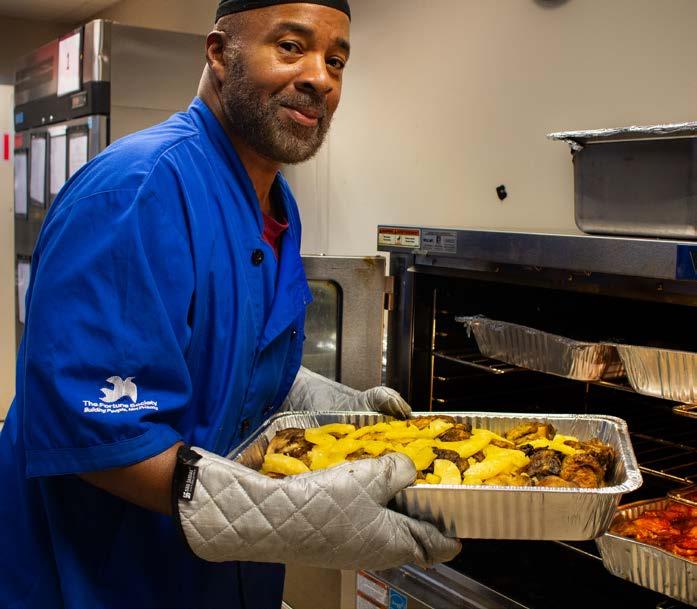
When I eat, I am no longer in prison. Instead, I’m a youngster, sitting
I got some bad advice when I first came to prison: “You gotta let go of the outside world. It’s only going to bring you heartache and disappointment. This is your world now.”
This is one of the dumbest things I have ever heard. My body may be imprisoned, but my mind certainly is not. I live in the memories of the loved ones I have left behind and hope for a better future when I can finally walk out and start the next chapter of my life. Education and vocational classes are the bridge to making those hopes and dreams a reality.
Do I see myself getting out and becoming the next Gordon Ramsey? No, not likely. But I can see myself using my business management skills and new culinary education. The possibilities are endless, and my future looks a heck of a lot more appetizing.
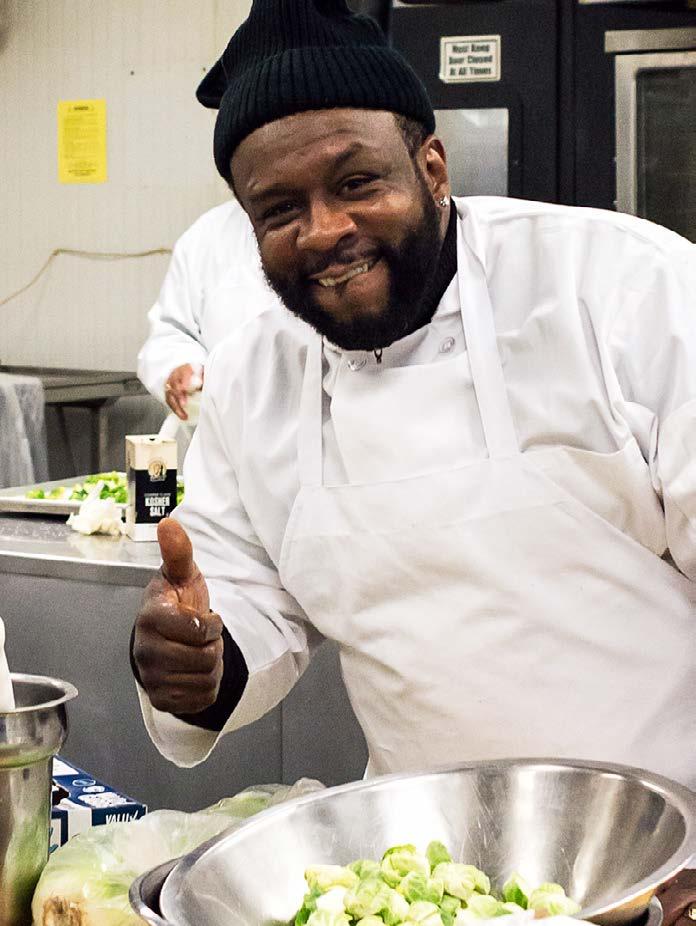
After my first visit to a jail, which was Rikers Island in December 1966, I commented, “This seems to be an exercise in institutional futility.” Nothing there seemed to prepare those inside for a return home.
I didn’t know that would begin more than a half-century of visiting jails and prisons across the country, including being an observer inside the yard at Attica during the 1971 uprising, teaching a class in Rahway State Prison in New Jersey, meeting with survivors in solitary in a New Mexico state prison after a brutal riot, running groups in the Brooklyn House of Detention, and hundreds of talks, visits and tours within the walls in Montana, Texas, Florida, Pennsylvania, Colorado, New York, Delaware, New Jersey and on and on.
My initial reaction to Rikers Island was continually confirmed. There were isolated programs, but the totality of the prison experience indicated that incarcerated men and women, first and always, had to learn how to survive in the humdrum, by-thenumbers environment, which also promised unanticipated violence. In short, prison survival has nothing to do with street survival. How people fare upon release seemed to be, and continues to be, an exercise in futility
in our archaic and life-destroying prison system.
I am of the opinion that our punishment factories could serve the greater society with realistic vocational training programs, utilizing community instructors in various fields. Almost every person currently locked up will be job hunting upon release. Along with safe housing, it is a survival priority and an antidote to crime.
By the dozens, each week at The Fortune Society and similar programs around the city and nation, returning citizens arrive with hope and dreams. Few have immediate employable skills or work experience. They need to be more experienced with job interviews or preparing a resume. There are numerous obstacles, so Fortune offers a few weeks of preparation for reality to join the dreams. All of this could have and should have happened before release when prisons have individuals 24/7.
One of the wonderous aspects of the human spirit is what we witness, almost daily, men and women overcoming roadblocks and political restrictions. They are the strivers who realize their dreams.
Here are some of the stories:
Fran O’Leary, one of the first women to come to Fortune, was invited to speak at a national conference in Hawaii. She impressed sufficiently to be offered a job running a program for young women in trouble. Fran lived and worked in Hawaii for two decades before retirement.
Charlie McGregor, whose dynamic presentation at speaking engagements reflecting on his 28 years in prison, led to a film offer and a career in movies and television. Most memorable are his roles as Fat Freddy in Shaft and in Mel Brooks’s Blazing Saddles. Charlie called me a few years back and said he could never have imagined the second half of his life could have been the total opposite of the first half, and he said, “It all began at Fortune.”
Let’s add them up: Richard Louis is a college professor; Stanley Richards was named Deputy Commissioner of Corrections in New York City (a historic first, but blessedly he’s now back at Fortune); Alex Mitchell is a lobbyist in Albany; George Freeman heads a church in Seattle, Washington; Mel Rivers departed Fortune to be head of security at an NYC hospital; Kenny Jackson was named a prison ombudsman reporting directly to then-Governor Mario Cuomo; Vinnie Defrancesco was the purchaser and manager of a major restaurant; Mikel Green Grande is a community outreach coordinator.
One of the wonderous aspects of the human spirit is what we witness, almost daily, men and women overcoming roadblocks and political restrictions.
Other jobs held by people coming through Fortune include a health counselor, landscaper, doorman, taxi driver, theatre manager, plumber, chef, nurse, computer analyst, art teacher and more than half the staff at The Fortune Society are formerly incarcerated. The list is endless and added to daily.

One of the most dramatic and historic journeys is that of Walter Strauss, whom I first met when he made his second state bid in Rahway, a New Jersey state medium-security prison. When he was released, he worked part-time at Fortune while attending college. When he graduated, he told
me he was considering law school. I was concerned that he might find a negative response from the Bar’s Ethics Committee, and he told me, “I’ll cross that bridge when I come to it.”
Walter graduated from Rutgers Law School and passed the Ethics Committee’s challenge. I couldn’t have been prouder of my friend as he diligently performed his duties as a lawyer.
Ten years after starting his law career, Walter called me one day and invited me to attend a ceremony at a downtown Manhattan courtroom. The following day, Walter Strauss was sworn in as a judge, the first

formerly incarcerated man to achieve such a title.
Now retired, Judge Strauss visits Fortune and proudly tells his story to men and women who have come through our doors just as he did.
I look at the new arrivals at Fortune, survivors of our shameful gulags, and I believe everyone has the potential to be:
• An inspired national leader like Malcolm X
• A movie star like Charles Dutton
• A NY State Assemblyman like Eddie Gibbs
• Or a judge like Walter Strauss
All were formerly incarcerated.
“One of the wonderous aspects of the human spirit is what we witness, almost daily, men and women overcoming roadblocks and political restrictions. They are the strivers who realize their dreams.”
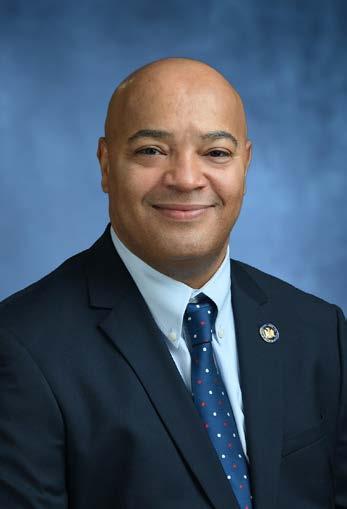
Because I am the first, my story inspires others. It resonates with the incarcerated and formerly incarcerated. That if I can turn my life around and achieve something no one thought I could or should be able to do, they have hope that they can do it too.
What would you say to someone with criminal legal system involvement who may be interested in running for office one day?
WITH ROB DELEON Executive Vice President and Special Advisor to the Deputy CEOWhy was it important for you to earn a degree while incarcerated?
Earning a degree while incarcerated while it provided me knowledge also helped me stay focused on the end game. Getting out and making sure I had a positive future in front me was most important. Having the opportunity to earn a degree, I knew, gave me a leg up, and created more opportunity for me when I was released. That’s why every time I visit our State’s correctional facilities, I make sure to encourage incarcerated individuals to pursue an education while they are away. I also advocate in the Assembly for more programming for the incarcerated as we know that it reduces recidivism.
How did you gain an interest in criminal justice reform?
Growing up in East Harlem I saw friends and neighbors interact with law enforcement and most of the time it was not in a positive way. Then while being away I met many
people who were incarcerated that felt unseen, some were innocent and falsely tried and accused. The injustice is heartbreaking. So, I decided that when I got out that I would help other formerly incarcerated people get their Certificate of Good Conduct. As an Assemblymember criminal justice reform is part of my platform.
What was the push that made you run for the Assembly?
Becoming an Assemblymember has been a goal of mine for quite a while. It’s a seat I ran for in the past. But honestly, the opportunity came when the 68th seat opened. My community called on me to run and came out to the polls in support of me. The people of East Harlem hired me to represent them in Albany and I’m up there making sure that our district’s voices are heard.
What does it mean to you to be the first formerly incarcerated state legislator?
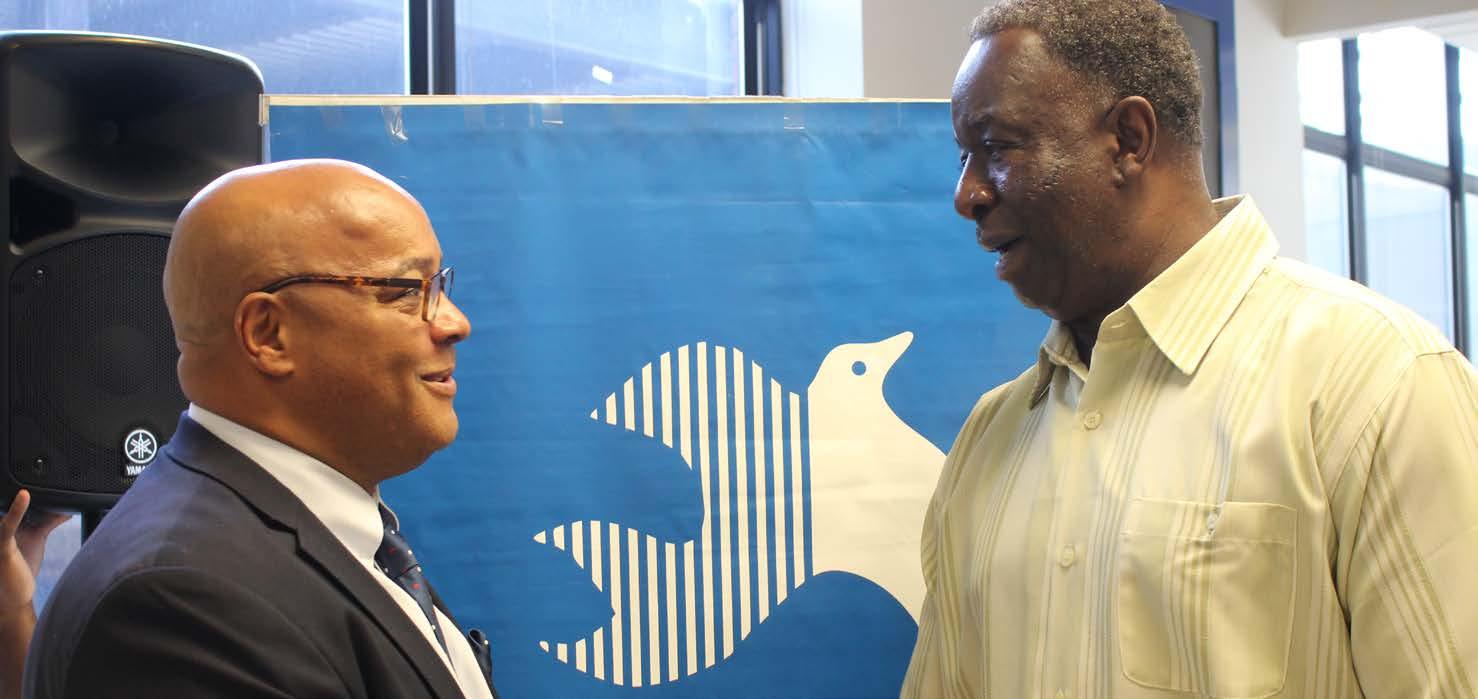
There are many people across the state that rely on my experience.
You will experience many naysayers, people that don’t trust you, but you didn’t become “reformed” for nothing right? I say you need to focus on perseverance and confidence that you can contribute and make a difference. You’re not bound by past mistakes. We learn from them and become better people.
Besides running for office, what advice would you give someone on how to be an advocate or supporter of reform? How can we make impactful change in our communities?
There are tons of ways to be involved. You can become a member of an advocate group and attend their rallies. You can support causes financially and share information on social media. We can make change by using our voices, by voting, volunteering, and simply being a good neighbor.
Making a good first impression during a job interview is essential; everyone wants to make a good impression. Since 2020, many businesses and companies have opted for video job interviews over in-person for various reasons. They save time, allow people to feel more comfortable in their own spaces and connect individuals in different places.
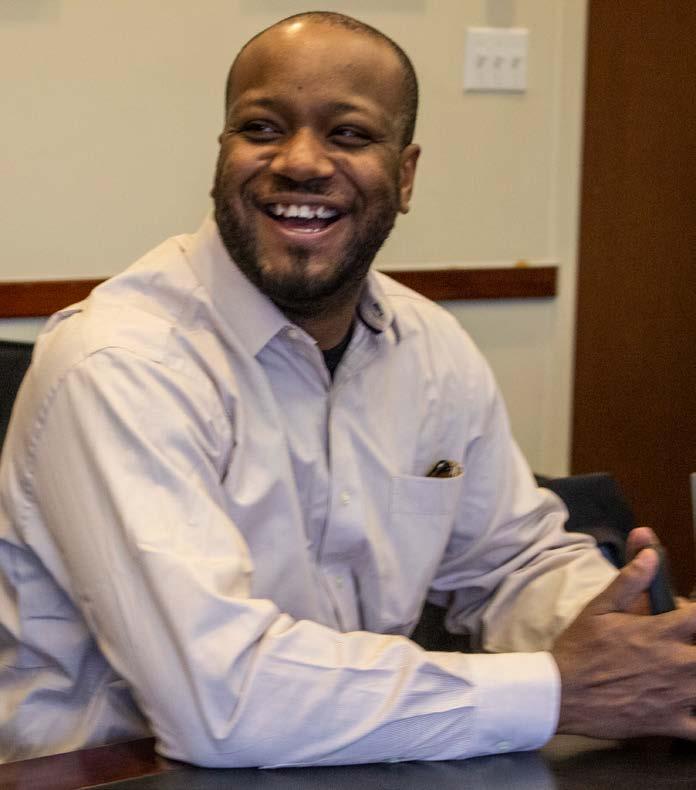
Here are some steps to nailing a virtual video interview:
• First, find a quiet place with a simple and neat background for your interview. If you need to use a background, choose something simple.
• Be large enough on the screen to make it seem like you are in the room with the interviewer.
• Do not have a bright light – like an open window – behind you. The cameras on our devices are very sensitive to light. A bright light behind you will blur out your face; the interviewer will not be able to see you well.
• Dress as if you were going for an in-person interview.
• Take a deep breath before you start – this will relax you and make your voice clearer.
When you first see the interviewer on your screen, make eye contact and smile.
Let the interviewer know you are fully prepared for the interview and interested in the job. Follow this four-sentence script:
1 Start with the appropriate “time of day” greeting: good morning, good afternoon or good evening. And if you start with “Hi” or “Hello” (because we are all creatures of habit), then add the time of day. Like this: “Hello …. good afternoon.”
2 Tell the interviewer your name exactly as it is on your resume. It would help if you said your name so clearly that they will not forget it.
3 Tell the interviewer the job you are interviewing for. That way, the interviewer confirms that you are on the same page.
4 Ask the interviewer: “Do you have a copy of my resume?” If the interviewer has your resume, you are good to go. If the interviewer does not have your resume, you’ll know you will have to work harder to provide the information the interviewer needs to figure out if you’re the right person for the job.
Here is a reminder on the intro: Deep breath. “Good Time of Day, my name is First name Last name, and I’m interviewing for the Example job. Do you have a copy of my resume?”
LOOK DIRECTLY AT THE CAMERA ON YOUR DEVICE. When looking at the person on the screen, you are looking at the image below or to the side of the camera on your device. And so, it does not seem like you are looking at them.
Say your name as if you are trying to teach a child how to say it: slowly, clearly, pronouncing each syllable.
You’ll need to send your resume to the person who is interviewing you. You’ll likely have their email from setting up the interview, so it is best to use that email if you know they don’t already have your resume.
Writing a resume after coming home from prison can be a challenging task, but it is an essential step towards reentry. A well-crafted resume can make a significant difference in landing a job and beginning a new career.
Here are some tips to consider when writing a resume after coming home from prison.

• BE HONEST AND UPFRONT: Honesty is crucial when creating a resume after coming home from prison. It’s best to be upfront about any convictions, as employers will likely conduct background checks. However, it’s also important to highlight any rehabilitation or educational programs completed while incarcerated to show a commitment to self-improvement and growth.
• FOCUS ON TRANSFERABLE SKILLS: When crafting a resume, focus on skills that can be applied to the job you are seeking. These could include skills developed while working in prison, such as culinary or custodial experience, or soft skills like communication, teamwork and problemsolving.
• USE A FUNCTIONAL FORMAT: A functional resume format, which highlights skills and achievements rather than job history, can be helpful for those with gaps in their work experience. This format allows you to showcase your transferable skills and relevant experience, even if it wasn’t gained through traditional employment.
• SEEK ASSISTANCE: If you are struggling with creating a resume, seek assistance from job placement programs, career counselors or reentry organizations. They can offer guidance and support in crafting a compelling resume and connecting with potential employers.
• BE PERSISTENT: It’s essential to remain persistent when job searching after coming home from prison. Rejection is inevitable, but don’t let it discourage you. Keep applying for jobs and refining your resume until you find the right fit.
Creating a resume after coming home from prison can be a daunting task, but with honesty, focus on transferable skills, and seeking assistance when needed, you can craft a compelling resume that showcases your potential as a valuable employee. Remember to be persistent, stay positive and believe in yourself as you embark on a new chapter in your life.
See our example on the next page for a format.
Remember, landing a job after incarceration can take time, but with determination and effort, it’s possible to rebuild your life and achieve success.

City, State
(123) 444-5678
Firstlast@email.com
RELEVANT SKILLS
Skill #1
• Include 3-4 bullet points that provide evidence of your abilities.
Skill #2
Skill #3
WORK HISTORY
Company Name, City, State - Position
example: The Fortune Society, Long Island City, NY – Case Manager
EDUCATION
Education Certification/School here
Year Certification/ Degree Received
The Fortune Society is proud to partner with local companies to provide our Employment Services participants with handson training that can lead to full-time careers. Nuthatch, one of our small business partners, has created their Fresh Start Program with Fortune’s help. They offer a three- to six-month paid, part-time internship to Fortune participants where interns work alongside trained professionals in an industrial kitchen that focuses on zerowaste food production.
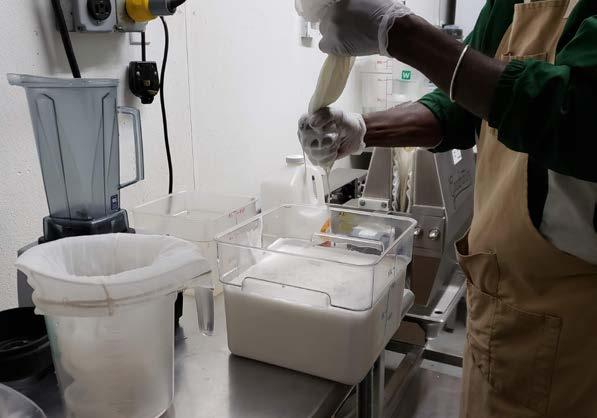
Since beginning the Fresh Start Program, Nuthatch has welcomed a handful of interns from Fortune, all of whom were ultimately hired and stayed with the small business for at least a year. Carolyn, the founder of Nuthatch, believes that Fortune’s level of service and support for their participants and business partners is a big reason that interns go on to succeed in full-time roles.
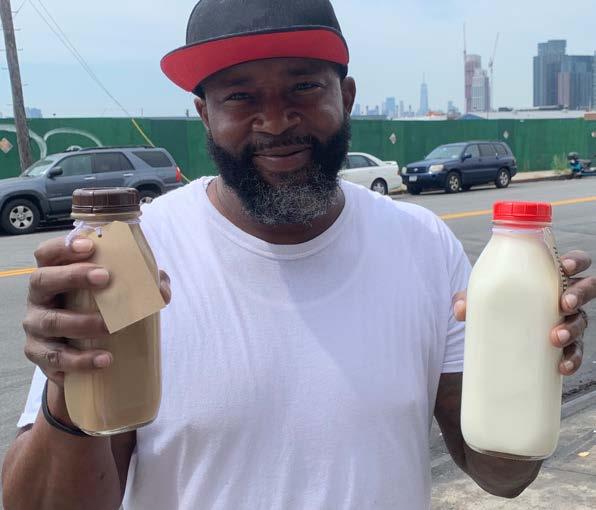
example: Bachelor’s Degree in Social Work
Location Attended 2023 Fortune College
same. My business gave me purpose, meaning, and something I have now come to define as ‘emotional’ profit’, which is what I believe every entrepreneur and business needs to succeed.
healing through our stories. I then endeavored to create a gourmet popcorn company that brought everyone together, while helping to eliminate social stigmas around hiring (formerly) incarcerated persons.
 BY EMILY O’BRIEN Co-Founder and CEO of Comeback Snacks
BY EMILY O’BRIEN Co-Founder and CEO of Comeback Snacks
Anyone thinking of starting their own business faces a long and daunting series of challenges when they begin.
Developing a product idea, designing the branding, brainstorming the strategy for operations and how to acquire customers — this all takes time and energy. It takes confidence to start out on this long path, but it takes real strength and resolve not to give up when challenges arise before that first dollar of profit is made.
Now, imagine trying to do all this while behind prison bars. It’s tough. But it’s doable, and I can tell you how.
I was incarcerated when my entrepreneurial venture truly began. It was driven by a desire to make a comeback in life, and to provide the opportunity for others to do the
Let’s begin with the elephant-inthe-room. After making some very poor decisions during an immensely stressful time in my life, I was sentenced to spend four years in prison at Kitchener, Ontario’s, Grand Valley Institution for Women. I viewed this not as an ending, but a new beginning; a chance for a second start to become the person I knew I was capable of being.
Comeback Snacks was born when I was chatting with other women in our prison kitchen. Regardless of our background, culture, or the crime committed, making food together was a special environment where everyone came together as one; to share stories, insecurities, questions, and aspirations. Making food was a place where we could begin healing ourselves; making ourselves whole again. I learned that regardless of our past histories, we’re all the same: human beings that need support, love, and a purpose in life. It was when the simple snack of popcorn was being made in our kitchen through simple and creative flavor combinations such as ‘lemon dill’ that my vision for social enterprise emerged. The popcorn was not only a delicious snack; it was a medium to socialize and find comfort and
There were immense challenges trying to start a business while behind bars, but with a supportive group of people advising me and helping me, they were overcome. From starting out with no funding, to using proper equipment and packing techniques, to attending events in the daytime and then racing back to my halfwayhouse in order to not violate any conditions of my parole, we – our team – made it happen together. Today, Comeback Snacks is sold in over 700 locations, including at some of the biggest retailers in Canada, as well as a handful of locations in the US.
But it’s not just retailers. Comeback snacks can now also be found in offices, at events, movie theatres, in
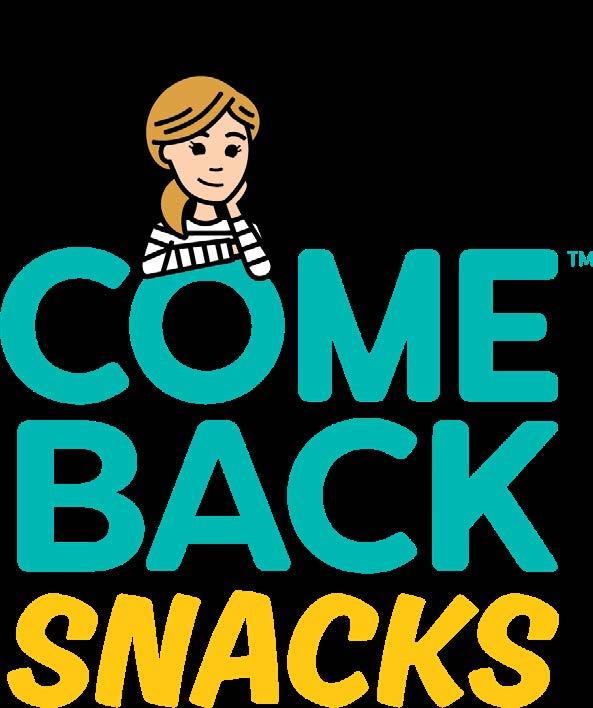
“Making food was a place where we could begin healing ourselves; making ourselves whole again.”
subscription and gift boxes, and at festivals across the country. I have been inspired by the wide variety of partnerships we have forged with multiple, diverse organizations, who are also dedicated to helping others find employment, emotional support, substance abuse treatment and other essential resources, upon their release from incarceration. Ending stigma and making comebacks happen is how we’re bringing change to the world.
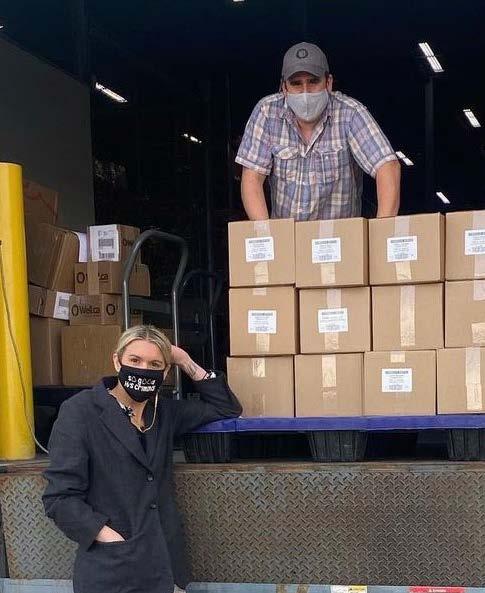
There are three key lessons that my time in prison taught me that still shape my business today.
First: there is immense power in forgiveness. Whether you are forgiving yourself for a past mistake, or forgiving
someone that has transgressed or wronged you, forgiveness allows you to reclaim that valuable and limited mental energy that you can re-direct towards bettering yourself and your business venture.
Second: resilience is more than a buzzword. Call it sheer grit, call it wisdom-building, or call it what it is: going through hell, and keeping on going until you’re out of it. I shaped myself in prison to become more flexible and resilient with whatever challenges befell me in life, and in business, this sense of resilience has helped Comeback Snacks weather a variety of different storms and come out stronger every time.
Third: the real profit in your business isn’t financial or economic. It’s emotional. Sure, no business can survive without making more money than it spends. But true profit must provide you with a sense of purpose, vision, and meaning, that feeds you that energy to forgive, be resilient, and be creative, resourceful, practical, and all of the other skills an entrepreneur needs to succeed.
The emotional profit that Comeback Snacks provides me is what sustains me as an entrepreneur, and as a human being that feels she’s making a positive difference in the world. It is also what fuels my drive to give others – especially those formerly incarcerated – the chance at a comeback in life. My advice to others is to reflect on your past — even the painful parts — and use the lessons of your own history to discover what gives you meaning in the world, and in your own business.
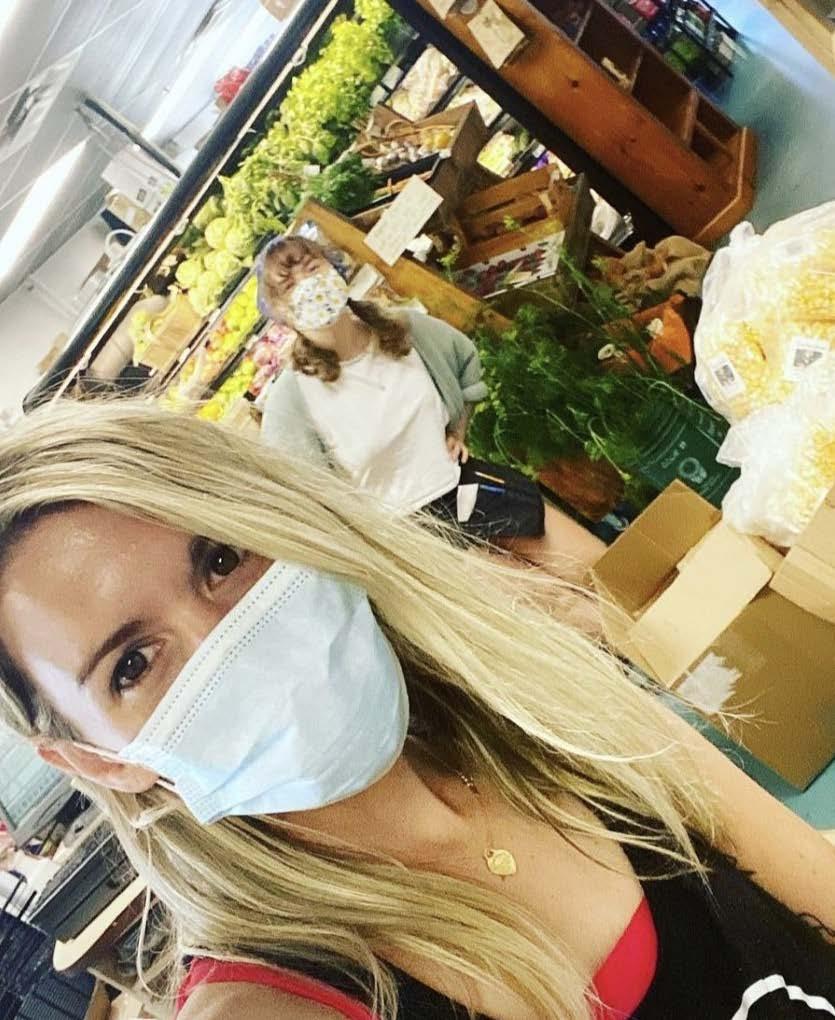
“The real profit in your business isn’t financial or economic. It’s emotional.”
The Fortune News is free to all people who are incarcerated.
To subscribe, please fill out the subscription form and send to:
Fortune News Subscriptions
c/o The Fortune Society 29-76 Northern Boulevard Long Island City, NY 11101
If you are not incarcerated, please send a $30 subscription fee along with your form. Subscriptions must be renewed once a year for paid subscribers.
If you are a person who is incarcerated and has been transferred, please renew your free subscription. Please allow four to six weeks for us to process your request.